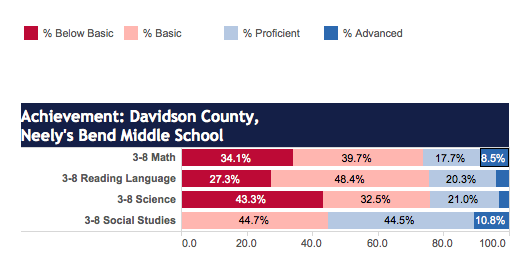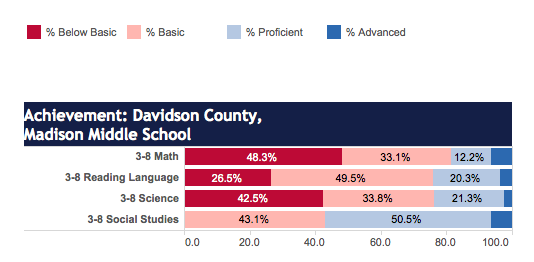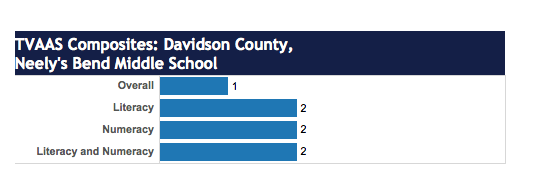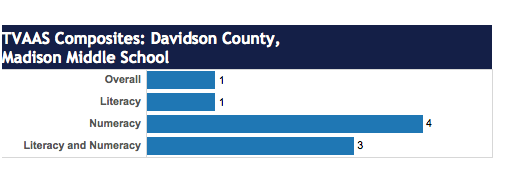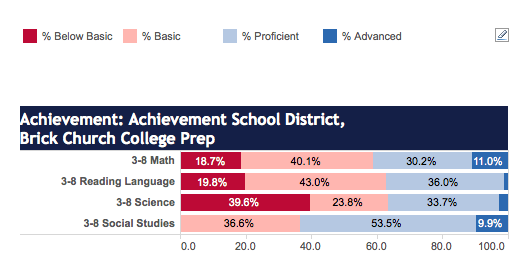Below is an interview with Achievement School District’s Superintendent Chris Barbic. Please note that this interview took place before the announcement of Neely’s Bend as the school that the ASD will take over.
In your view, how is the Achievement School District doing overall?
We are basically in our third year of having schools in the system. Our first year is really just the planning year. There are a lot of ways to answer that question. The short answer is we are certainly seeing schools that are making really strong gains.
If you look at our schools last year, that finished their second year, that’s our oldest cohort of schools we have. If you look at those six schools, there is a group that averages about 6 point gains composite. If you just look at the charter schools, the three charter schools, they average about 11 point gains, which is that double digit gains that we like to talk about and we like to see. Three of our charter schools who are in the second year, last year, were level five growth. Two of the three made if off the priority list in just two years time.
I know there are lots of people that want to be quick to judge on how we are doing, I think what’s important for people to remember is that of the 17 schools that we have last year, two-thirds were in their very first year. I think it’s a little quick to judge on the entire body of work because the vast majority of schools last year were in their first year.
So when you look at our second year schools, you are seeing lots of promising signs, especially our charter schools, are doing well. On the flip side, there is certainly room to improve. We are trying to come at this with the appropriate level of humility. The schools that we are going into, there were lots of teachers, principals, and dedicated folks who cared a lot about the kids.
Unfortunately, that didn’t translate into the progress and gains that we wanted to see. We understand that this is not easy work. We really try and highlight that this isn’t about a one principal or a group of teachers, what we are really trying to highlight is that this is about how you build a new type of system.
When I took this job, the charge was to build a school district from scratch. The first thing anybody would do would be to look around and find who was doing this well. We wanted to model ourselves off a large or medium urban school district. If you look around the country, to see who the districts are that we want to build ourselves after, there wasn’t one example we could point to. There wasn’t one urban district in the country that was getting it done with all kids. I think when you can’t point to one example, that says to me it’s a systemic problem.There is a problem with how the system is set up.
We tried to take advantage of the opportunity to build a new type of school system. Trying to reform an existing school district that was structured and set up almost a hundred years ago, it’s trying to make a model T work better. It’s an outdated system. What we are trying to put forth is how do we build a car for the 21st century? How to build a car for 2015?
How do you build a district that is more aligned with things that we know work in schools around finding great educators and giving them economies and putting resources down in the building level and not a top down bureaucracy that mandates excellence, but an organization that bottom ups and tries to release excellence. That’s the organization that we are trying to build and why we have chosen to partner with high performing charter organizations to do the work.
What do you think about all the parental feedback that you received from the meetings at Madison and Neely’s Bend?
Unfortunately, we did not hear enough of it. I think the purpose of those meetings was to hear from parents. I think instead what happened was we heard from a few parents. A lot of the people in the meeting were folks that either weren’t from the school community at all or were elected officials that unfortunately chose to put information out there that was, at best, misleading. It wasn’t really until after the meeting was over that we got to really sit down and talk to parents.
Fortunately for us, beside the parent meeting, one of the things we have done in the community is that we had a team of folks out knocking on doors and block walking. The weekend leading up to the parent meeting, they knocked on all the fourth graders doors in the elementary schools that cede into Neely’s Bend and Madison. That’s really the group of kids that are going to be impacted the most by this decision. LEAD will only be serving fifth grade next year.
What we found was interesting. A lot of the parents, especially the ones that were the most engaging in their kid’s education, already decided that they were not going to send their kids to Madison or Neely’s Bend. They were already looking at other options to send their kids outside the neighborhood because of the reputation of the schools.
Another group of parents that were a little less engaged and more open to the idea of what LEAD was proposing to do. But, had there not been this conversation about the dramatic change that could potentially happen at one of the schools, they were much more inclined not to send their kids to those schools either.
The reason I bring this up is because we think there should be a great neighborhood option that kids and families can access that is right in their own backyard. They shouldn’t have to choose options outside of their community for them to go to a good school. If you look at most of the schools in the low-income parts of Nashville and Memphis, where we do most of our work, the fact is there aren’t enough good neighborhood options. If you look at kids in the priority list, two in ten of those kids can’t read. That’s just not an acceptable number on anyone’s measure. We can all debate data, but no one can agree that’s acceptable.
I think there are a good number of parents who don’t understand and are skeptical about it. That’s understandable. This is new. This is a change. There are just as many parents, if not more, that are open and excited for a great school in their neighborhood. That’s all we are trying to do. To deliver a great school to kids in either Neely’s Bend or Madison because we believe that’s what they deserve.
How does the ASD on the whole is dealing with literacy?
If you look at our data, in our first year we saw growth in math and science. Our proficiency scores in reading dipped the first year. Last year we saw that trend reversed. We actually grew faster than the state average in reading and math last year if you look across all of our schools. That’s an important measure for us, most of our kids are behind grade level, and our kids need to catch up. If our kids aren’t growing faster than the state average, we are never going to close the gap. That’s an important number to look at. Last year, our kids grew faster than the state average and both middle, elementary, and high school.
I think it gets to how we set up our organization. If you would ask someone in the district how they handle reading, they would tell you that we use XYZ program and the central office pushes that out to the schools to implement that program. Maybe there is some flexibility for teachers and schools to build things on their own, but it’s probably more that they don’t feel like they are getting supports form the central office and they are left to figure things out on their own.
I think the way we approach that is that we believe that teachers and principals who are in schools closest to kids need to make the decisions that matter most in what academic programs should look like. We all have to teach the same standards. The standards are the standards. How we teach those standards should be up to the people that are closest to the kids. That’s the principals and teachers.
Our whole philosophy is that we are not going to tell you which literacy program to use. We are not going to tell you how to teach literacy. What we are going to do is having a rigorous application process for you to get a charter with us. We are going to go through your academic program and we are going to look at your track record and results.
Once you have been approved to open your school, we are going to let you make the decisions around curriculum that you think will be best for your kids. We are going to agree on some benchmarks for progress. We are then going to hold you accountable for results. We just believe that folks sitting in a central office are not the ones in the best positions to make decisions bout what’s best for kids. The people who are in the best position are folks in the classroom.
I think too many times that we see these big top down bureaucracy that lots of decisions get made by people in the central office. Sometimes they get rolled out well. Sometimes they don’t. We don’t lean on people in the schools to make the decisions that matter most. I think that’s where these big top down traditional districts get it flat out wrong. It’s why we have tried to approach this in a different way.
Do you think the decorum of the education debate is gone?
We stopped listening to each other. I have been painted all sorts of ways in Twitter and Facebook. At the end of day, I taught for six years. I taught sixth grade in an elementary school. The whole reason why I got out of the classroom to start a middle school was because I was tired of watching my elementary school kids go off to local middle schools and have a terrible experience.
I was listening to one horror story after another when my kids would come back to visit my classroom. It broke my heart. I can complain about the middle school, the system, or everything that’s not working, or I could try and do something about it. I chose to start a charter school that served kids in that neighborhood. It grew into a network of schools and thirteen years later I am taking a job and moving to Tennessee.
I say all that because it’s not like anybody on either side of the debate woke up with horns growing out of their heads. Most of the people that are engaged in this debate and conversation genuinely care about kids and genuinely want to see schools get better. I think that when you see some of the misinformation that was spread at the meeting in the Nashville, like when the union passed out flyers. The ironic things about the flyers are that they said “Facts” and it had statements after it and there wasn’t one fact following the statements on that flyer.
When I see that, I tend not to give the people the benefit of the doubt that they are doing this for kids. I think most people are. I think where people get hung up and where we start to fight is while we agree on the what. We want better schools. We disagree on the how.
I think that’s okay because the debate is going to make us all better. We lose a lot when we stop listening to either other. You go to Twitter and each side puts something up that will benefit their side of the argument. Everyone yells in their little echo chambers. I think the other thing, which is unfortunate, is that we don’t come after this with the appropriate level of humility and recognizing that maybe not all of our answers are right. Maybe, there is actually some merit to what the other side has to say.
I think until we are able to listen and agree that no one has a monopoly on good ideas, we are going to continue to lob on to each other. I don’t think that’s helpful. I tried to really reach out and talk to people on both sides of this thing. Sometimes I get fired up and passionate and that is what it is. That happened at the meeting last week. But I think we all have to do a better job of listening to each other. Giving each other the benefit of the doubt that we are coming at this with the same end goals and that is better schools. We have to keep talking about the how.
Where people chanting at the meeting you were leading?
Jill (Speering) tried to get a chant started. What was unfortunate was that there were parents trying to speak. It wasn’t even a parent in favor of the ASD being there. When you got school board members leading chants and shouting down parents who are trying to talk, it’s not helpful. None of us are evil people. We are all trying to do good work.
I just think a little more decorum or a little more humility and willingness to listen to the other side would benefit all of us. I don’t know where things got off track. Maybe that started to happened before I even go here. It sure would be refreshing to try and get things back on track so we can have productive conversations about kids.
Is there anything that is being overlooked in the current education debate?
I do think, unfortunately, that we don’t talk nearly enough about kids. We also don’t talk about what works and what hasn’t. I don’t think we talk enough about our willingness to be innovative. Innovation can be reckless. We can’t run social experiments on children. That’s not what we are trying to do. But there is a place for innovation.
If you time warp someone who was alive 100 years ago. Walked him through a normal day. Take him to the grocery store. They look different than they did 20 years ago, you can check yourself out now. Take him to an airport, or a bus stop, or any place that he would be used to a 100 year ago would look completely different.
Except, if you took him into a school and it would look pretty much the same. There would be a hallway with classrooms, and the classroom will either be in rows or tables. We have whiteboard instead of chalkboards. By in large, they would probably feel most familiar walking through the halls of a school. That’s crazy.
To think of all the technology and changes and advances that we have made as a society in the last 50 years. For that innovation to completely steer clear of most of what’s been happening education today, there’s a problem with that. There is not enough conversation about kids. There is not a conversation about what works and what doesn’t and how we innovate as a profession.
Will the ASD have a bigger presence in Nashville?
I think that you can’t ignore the fact that the number of priority schools in the city grew from 6 to 15. You can’t ignore the fact the number of kids attending priority schools in Nashville doubled within the last two years from 3,000 to 6,000. That’s a fact.
If we can find partners like LEAD that are willing to do turnarounds in priority schools in Nashville and have a track record and the quality team we believe LEAD has, then yeah, we will expand and we will grow. We will only do it when we feel like we can partner with high performing organizations that will do good work. Assuming we can do that, then we plan to grow our presence here.
For more on education politics and policy in Tennessee, follow @TNEdReport
